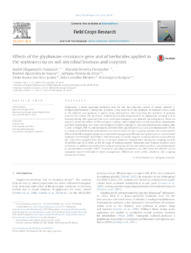Effects of the glyphosate-resistance gene and of herbicides applied to the soybean crop on soil microbial biomass and enzymes.
Effects of the glyphosate-resistance gene and of herbicides applied to the soybean crop on soil microbial biomass and enzymes.
Autoria: NAKATANI, A. S.; FERNANDES, M. F.; SOUZA, R. A. de; SILVA, A. P. da; REIS-JUNIOR, F. B. dos; MENDES, I. C.; HUNGRIA, M.
Resumo: Glyphosate, a broad-spectrum herbicide used for the non-selective control of weeds, inhibits 5-enolpyruvylshikimate-3-phosphate synthase, a key enzyme in the synthesis of aromatic amino acidsin the shikimic acid pathway in plants, fungi and bacteria, thus impairing the synthesis of proteinsrequired for various life processes. Soybean genetically engineered to be glyphosate resistant (GR orRoundup Ready, RR) represents the most cultivated transgenic crop globally, including Brazil. There areconcerns about the effects of RR transgenic soybean and of glyphosate on soil microbial communitiesand their functioning. Our study was designed to detect changes in soil microbial biomass-carbon (MB-C) and -nitrogen (MB-N) and in enzyme activities [beta-glucosidase (GLU) and acid phosphatase (PHO)]in a large set of field trials performed at six sites in Brazil for two cropping seasons. We evaluated theeffects of the RR transgene, glyphosate and weed management (RR soybean + glyphosate vs. conventionalsoybean + conventional herbicides), with three pairs of nearly isogenic soybean cultivars evaluated persite. Soils were sampled from the 0?10 cm layer, between cropped lines, during the cropping seasons2004/2005 and 2005/2006, at the R2 stage of soybean growth. Univariate and contrast analyses wereperformed in addition to multivariate analyses including all four microbial variables, and denominatedas soil microbial variables (SMV). In general, microbial parameters and SMV were not affected by thetransgene, type of herbicide or weed management. Differences were, rather, related to site, croppingseason and cultivar.
Ano de publicação: 2014
Tipo de publicação: Artigo de periódico
Unidade: Embrapa Soja
Palavras-chave: Qualidade da soja, Soja, Soja transgêncica
Observações
1 - Por padrão são exibidas publicações dos últimos 20 anos. Para encontrar publicações mais antigas, configure o filtro ano de publicação, colocando o ano a partir do qual você deseja encontrar publicações. O filtro está na coluna da esquerda na busca acima.
2 - Para ler algumas publicações da Embrapa (apenas as que estão em formato ePub), é necessário ter, no celular ou computador, um desses softwares gratuitos. Sistemas Android: Google Play Livros; IOS: iBooks; Windows e Linux: software Calibre.
Acesse outras publicações
Acesse a Base de Dados da Pesquisa Agropecuária (BDPA) para consultar o acervo completo das bibliotecas da Embrapa.

